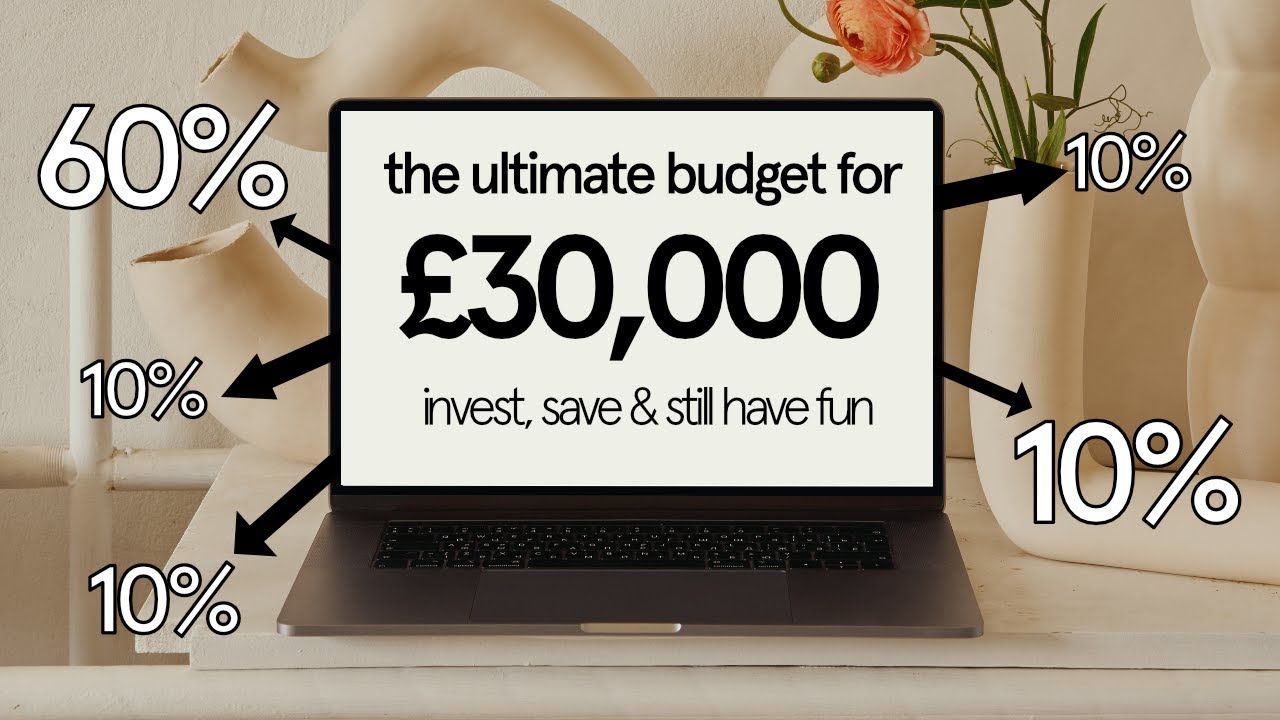The average salary for graduates in the UK, for the 5th year in a row, is a big whopping £30,000.
Now your actual graduate salary may be higher or lower than this, depending on a huge range of factors, so I’m going to use percentages in this guide so you know exactly what to do you with your newfound monthly salary.
Your actual take home pay—the money hitting your bank account every month—is £1,826.
This is after about £454 in tax and national insurance, £20 in student loan repayments, and £198 pounds of your pension contribution.
I’ve used a 10% pension contribution which is also the UK average. I would recommend maxing this, according to whatever matching policy your workplace provides.
The pension contribution calculation I like to live by is having an overall contribution of half of your age in percentage. So if you’re 22, a contribution of 11%. So if your employer has a matching contribution policy, aim for a 5.5-6% contribution, totalling 12%.
So out of this £1,826 total you receive, we’re going to apply the 60/10/10/10 method that I explained over in my secret to saving money video:
- 60% – essentials, bills, utilities council tax, rent or mortgage
- 10% – investing in an asset or stocks/shares
- 10% – building up your emergency fund
- 10% – buffering up a sinking fund
- 10% – fun money
Essentials
With 60% being for essentials, it gives us about £1,095. The premise of the 60/10/10/10 method is that it’s more rigid than you think.
If you can keep essentials to 60%, instead of letting your essential costs determine the percentage… we can control costs a bit better. This might mean looking for a smaller place to live, cutting down utilities usage etc.
Asset building
Investing 10% of your take home pay, about £182, as early as you can is key to having a proper budgeting system in your early 20s.
A HUGE part of the 60/10/10/10 method is that this 10% goes out before you even realise you’ve been paid! For me, this 10% goes straight to my index funds in Vanguard.
After a year, with a rate of return similar to this year (which isn’t guaranteed, and is just being used as an example..) you’d have £2,795 in your investments. A great start after a year! You can also send this into any kind of savings account you want – if you want to buy a place, look at a Lifetime ISA.
Emergency fund
The next 10% batch of £182 going into your emergency fund, which should be in a quick access ISA or another savings account.
For our emergency fund, we’re going to aim for 4.5 months (bang in the middle of the recommended 3-6 months worth of backup money), made up of the 60% essential total and a 10% discretionary total = £1,300.
Which gives us a total of £5,850. This will take about two and a half years to save up for, unless you decide to top it up with any one-off lump sums of cash as and when you want to.
Your salary could also go up, which means the 10% payment will go up. Once the 2 and half years are up, you’ll have an extra 10% to allocate somewhere (unless you wanna keep buffering up the emergency fund to 6+ months!)
Sinking funds
Your sinking fund is an important chunk of the 10% cos you gotta control it. I always talk about having a credit card that gives you points for spending you wanna do – whether this is on big purchases, flights or just food shops.
But the yearly total you’ll be putting away of £2,184 will go towards paying off this credit card in full. I would recommend having this sinking fund in a different account, so you still have a standing order set up from the account that you earn your total income into.
This will mean that even if you spend over or under on your credit card from month to month, you still have the sinking fund building up just in case.
Fun money
The final batch of the £182 10% chunk is fun money. I personally use digital banks for fun money as it automatically tracks what kind of spending I do month to month and has the awesome pots feature, which lets me budget for things like eating out or shopping, which are things I actively want to limit.
Fun money is something you absolutely have to control. For me this has been done through really locking in my shopping habits and impulse buying, questioning a lot of my ‘wants’ and never following through once something is in my shopping basket.
While this system will be hard to stick to for a year, it will be SO REWARDING when you eventually get promoted, get a better salary and see how much you have built in only 12 months.
I promise you, you will not regret the 3rd or 4th drink you didn’t get because 10% of your salary didn’t stretch that far… instead you will be excited that you could maybe afford a holiday or can actually say you have more to your name than just your possessions—you’ll have investments, whether that’s in index funds, ETFS, or a house-saving fund.

Leave a Reply